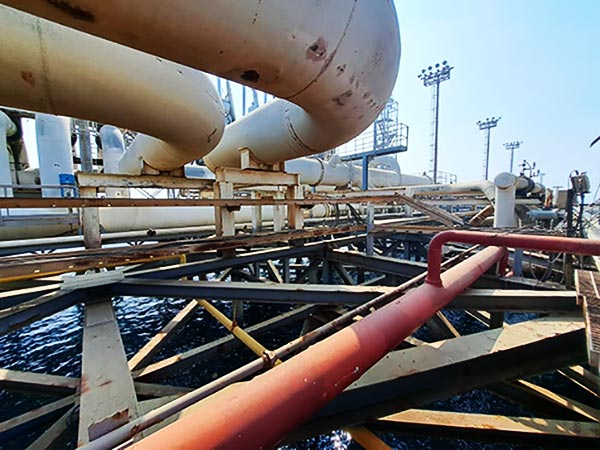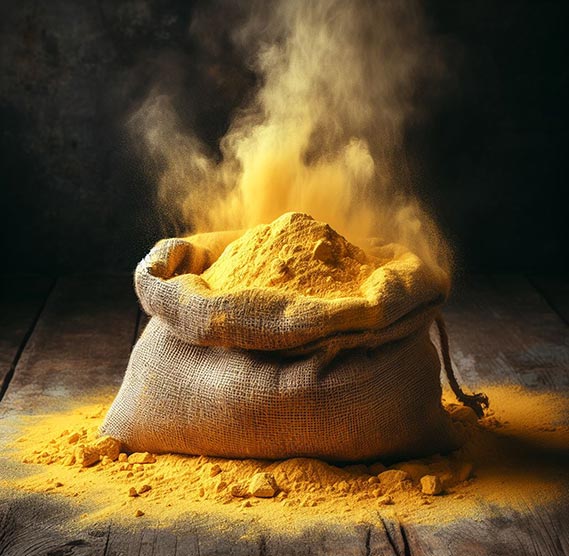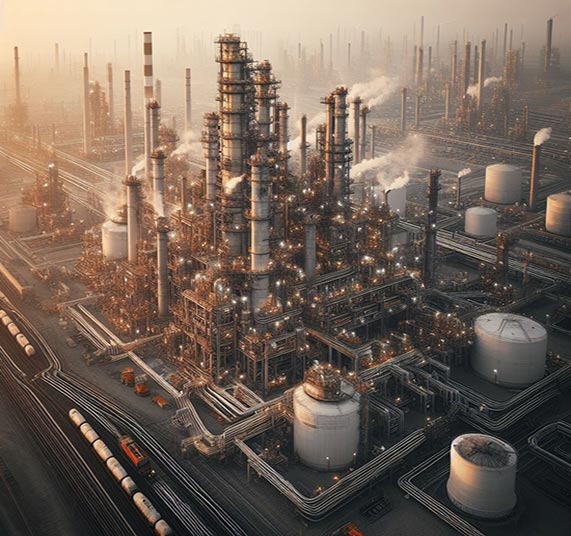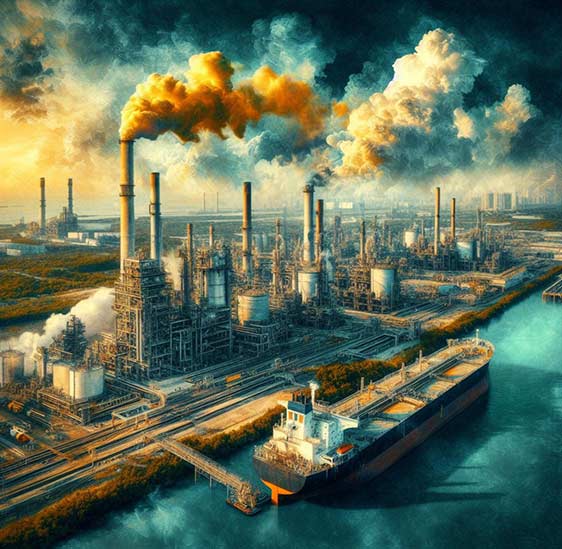palayesh cood
refinery
Refinery is a public or private industrial production unit that is designed and built for crude oil particles and processing of crude oil materials. The main program of refineries is to convert crude oil into required petroleum products such as gasoline, diesel, fuel oil, diesel, kerosene, tires, chemicals, and other petroleum products.
Oil refining operations include various stages including distillation, cracking, hydrotracking, hydrogenation, chemical reactions and refiners. In these processes, petroleum materials are transformed into final products using different technologies and high efficiency.
Refineries play an important role in providing fuels, petrochemicals, energy and petroleum products in communities. They are used to meet energy and fuel needs in automobiles, industry, transportation and other economic sectors.
On the other hand, refineries must comply with environmental standards and laws and try to minimize pollutants and negative effects on the environment by using advanced technologies.
What products are produced in a refinery?
Refineries are used to produce various petroleum products. Below is a set of petroleum products that are produced in refineries:
1. Gasoil: Gasoil is also an important fuel used for diesel engines, including some passenger cars and all heavy vehicles, trains and other vehicles.
2. Gasoline: Gasoline is one of the main products of the refinery and is used as fuel for cars.
3. Kerosene: Kerosene or also known as diesel fuel. This fuel is used for cars, trucks and heavy machines.
4. Diesel fuel: This is a heavier fuel that is used in ships, power plants and other industries.
5. Liquid oil: Liquid oil or crude oil is one of the primary products of the refinery, which can be added in the refining process and transformed into other oil products.
5. Kerosene: Kerosene or also known as diesel fuel. This fuel is used for cars, trucks and heavy machines.
7. Tires: Refineries also produce raw materials for the production of tires.
8. Chemicals: Refineries can produce various chemicals such as ammonia, polymers, bitumen and other chemicals.
Can a refinery produce fertilizer?
Yes, a refinery can produce fertilizer. In fact, some refineries, known as petrochemical refineries, are capable of producing petrochemical products in addition to producing petroleum products such as gasoline and diesel. Petrochemical products include various chemicals such as plastics, resins, fertilizers, rubber, etc.
Typically, fertilizers are produced in refineries as part of the process of converting crude oil into petrochemical products. In this process, mineral and chemical substances such as nitrogen, phosphorus and potassium are separated from crude oil and sold as different fertilizers.
Using refineries to produce fertilizers can also make economic sense, because refineries can more efficiently produce needed fertilizer due to access to crude oil and its processing infrastructure.
How many categories are refineries divided into?
Refineries are usually divided into different categories based on the type of refining process and the final products produced. Below are several common categories for refineries:
1. Distillation refineries: These types of refineries constitute the largest number of refineries. In these refineries, crude oil is transformed into products such as gasoline, diesel and fuel oil using the distillation process.
2. Cracking Refineries: In these types of refineries, the cracking process is used to convert crude oil into lighter products such as gasoline and diesel. This process involves breaking down the larger molecules of crude oil into smaller molecules.
3. Hydrogenation refineries: In these types of refineries, the hydrogenation process is used to refine and improve the quality of petroleum products. This process includes increasing the content of hydrogen in petroleum products and reducing the content of pollutants.
4. Hydrocracking refineries: These types of refineries use hydrogenation and cracking processes at the same time. The aim of these refineries is to produce high quality gasoline.
5. Petrochemical refineries: These types of refineries not only produce petroleum products such as gasoline and diesel, but also produce petrochemical products such as plastics, resins, fertilizers and other chemicals.
Additionally, refineries can be further categorized based on production capacity, size, and location, but the above categories are based on the type of refining process commonly used.
Refinery products in the world markets
Refinery products, as one of the important factors in the global energy market, are traded in different exchanges and markets around the world. Some of the famous refinery products that are traded on the world exchange are:
1. Crude oil: Crude oil, as the main product of refineries and the main source of production of other petroleum products, is traded on the global oil exchange (such as the New York Oil Exchange). The price of crude oil depends on various factors such as supply and demand, production policies of countries, the global and political situation of producing regions, and other things.
2. Gasoline: Gasoline, which is one of the final products of refineries, is traded on various energy exchanges. Gasoline prices are usually determined by supply and demand, legal restrictions, taxes, and other factors.
3. Diesel: Diesel is also traded in energy exchanges as one of the final products of refineries. The price of diesel is affected by the same factors as gasoline.
4. Fuel oil: Fuel oil is another refinery product that is traded on energy exchanges. Diesel fuel is the cornerstone of energy production in the transportation and industry sectors.
5. Natural gas: Natural gas, as a clean and important energy source, is traded in global energy exchanges. The price of natural gas is affected by various factors such as supply and demand, reserves, legal and political restrictions and others.
The trading of these products in different exchanges and markets allows oil companies, traders and investors to trade and invest in the global energy market. Prices in these markets may vary due to several factors such as Unfortunately, I do not have access to global market updates as my latest data stops at September 2021. For more accurate and up-to-date information about the prices of refinery products in the global stock market, it is better to refer to reliable news and financial sources or refer to expert financial advisors.
The impact of establishing a refinery on the environment
Establishing a refinery can create new impacts on the environment. Some possible effects include:
1. Air pollution: Refinery processes can increase air pollutants. The emission of greenhouse gases and suspended solid particles caused by refinery activities increases air pollution and affects the air quality of the region. These pollutants may have a negative effect on the health of humans, animals and plants.
2. Water pollution: Refinery processes require large water consumption. Using water to this extent may lead to the reduction of water resources and the destruction of aquatic habitats. Also, effluents produced from refineries can contain pollutants that penetrate and contaminate surface and underground waters.
3. Climate changes: Refinery activities can lead to climate changes and pollution. Emission of greenhouse gases such as carbon dioxide (CO2), methane (CH4) and nitrous oxide (N2O) from refineries can lead to global warming, melting of glaciers and changes in precipitation patterns in different regions.
4. Destruction of habitats: The establishment of a refinery may lead to the destruction of natural and ecological habitats in the region. The construction of the refinery in areas that are important as habitats for animals and plants can lead to the loss of habitats and disruption of the ecological balance.
5. Accidents: Refineries have risks that may occur. Explosions, fires, leaks and waste pollution can lead to serious damage to the environment. Also, measures can be taken to reduce the negative effects of refineries on the environment. Some of these measures include:
6. Using cleaner technologies: Using cleaner and updated technologies, such as proper filtration to reduce air and water pollutants, can help improve environmental quality.
7. Waste management: improving and controlling waste management methods can reduce the effects of water and soil pollution. This includes the use of optimal waste collection, recycling and disposal methods.
8. Use of renewable energy sources: Increasing the use of renewable energy sources, such as solar and wind energy, instead of fossil fuels, can help reduce greenhouse gas emissions and climate impacts.
9. Establishing monitoring systems: Setting up continuous monitoring systems to monitor the activities and environmental pollution of refineries can help to identify problems and improvement measures.
10. Promoting the use of sustainable transport: Increasing the use of public transport, electric vehicles and sustainable transport systems can lead to a reduction in air pollution and a reduction in car-dependent traffic.
11. Compliance with environmental standards: Implementation and compliance with environmental standards related to refinery operations and exploitation can help reduce negative impacts on the environment.
Using cleaner methods, new technologies, and sustainable technologies in refineries can help reduce negative impacts on the environment and help maintain environmental sustainability.
What is the difference between petrochemical and refinery?
Petrochemical and refinery are the two main parts of the oil and gas industry, and each plays its own role in the oil production and processing chain.
1. Refinery: Refineries are responsible for converting crude oil into petroleum products such as gasoline, diesel, light and heavy petroleum products, diesel, fuel oil, and other products. In refineries, operations such as distillation, decomposition, hydrogenation, cracking and compounding take place. The main purpose of refineries is to produce quality and standard oil products, to recover more economic value from crude oil and to reduce environmental pollution.
2. Petrochemistry: Petrochemistry deals with the production and processing of chemicals from oil and gas products. In petrochemicals, crude oil and natural gas are chemically converted and used to produce basic chemicals, polymers, paints, rubbers, fertilizers, pharmaceuticals, and plastics. In addition to producing chemical products, petrochemical plays an important role in creating employment and increasing economic value.
Therefore, refinery and petrochemical have differences in terms of their tasks and production processes. Refinery focuses on the processing of crude oil and the production of petroleum products, while petrochemicals focuses on the production and processing of chemicals from oil and gas.




